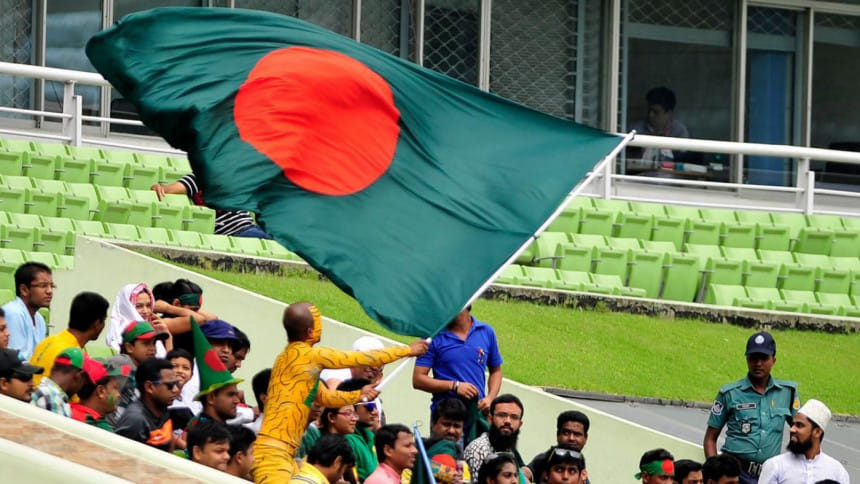The justifiability of BCB playing hardball

It is not very often that I can laud the Bangladesh Cricket Board (BCB) for its professionalism or foresightedness. BCB's financial muscle has strengthened, cricket players of the country have become more professional; however, the same cannot often be said about the professionalism of BCB's management. But, BCB's insistence on sticking to the Future Tours Programme (FTP) and to flatly rule out the possibility of opting for a neutral venue for the English National Cricket team's tour in October this year, is, in my opinion, a rare glimpse of professionalism and foresightedness.
I can appreciate that there may be many Bangladeshis who agree with BCB's position but may, nevertheless, resent the public statement or question the pragmatism behind it. According to this line of thinking, hardball play tactics, as expressed through the strong words of many, backfire and could elicit an equally tough response from the England and Wales Cricket Board (ECB) and English National Cricket team's players. And it would be a loss for cricket in Bangladesh. But Mr. Eoin Morgan, the English Cricket team's limited over match captain, has already made his concern public and there have been considerable media speculations about the ECB's shadow of doubt regarding the tour of Bangladesh. For this reason, I do not think that the public position of BCB is untimely or non-strategic. The only concern that I have with this approach is whether or not BCB can stick to its current position. It would be very unfortunate if (without any significant change or drastic events) the BCB, in the near future, decides to backtrack and opts for playing matches in a neutral venue. However, as long as the BCB sticks to its position, I do not find any flaw in its hardball play approach.
While cricket is a passion for our country, we should, at the same time, not lose sight of the bigger picture here. In some ways, this is also an issue that is bigger than just cricket. If BCB opts for a neutral venue for the tour, it would send a signal, not just to the cricketing world but to others as well, that Bangladesh has become so insecure a place that Bangladeshi administrators themselves are not considering the country safe enough to host an international cricket team. Surely that would send an unmistakably clear signal of lack of confidence and resignation. As the host, BCB has to do everything within its means to ensure the safety of the players, match officials, and spectators, and try to assuage all their concerns, including those of the ECB. But it cannot just concede to each and every demand made by the ECB or other cricket boards, just to go ahead with a scheduled tour. It would seem that the BCB has appreciated the dangers that lurk within such a choice.
As with any other cricket board, the ECB is entitled to take its decision based on the available intelligence and security advice of the experts. The English team's captain and other members of the team are perfectly within their rights to vent their concerns about their safety in Bangladesh or to decline to tour Bangladesh. The decision to decline to tour may even be taken by an individual player, even though the administrators usually take the final decision to send their teams to other countries for international matches. After all, a player is not a member of an army regiment who would have to follow the command of the superior come what may. However, any fair-minded observer cannot but question the consistency of the choices made by some western cricket administrations. As I had written in this newspaper when the Australian national Cricket team cancelled their tour last year, in an increasingly intolerant and violent world, terrorism is not a threat confined to Bangladesh or the economically underdeveloped world alone. This is amply clear from the terror attacks in the last few years. However, despite very grave terror attacks in Mumbai, London, and Sydney, bilateral series, as well as World Cup matches, have not been interrupted. Nonetheless, when it came Bangladesh, even before any significant terror event (here I am referring to last year), the tour was cancelled. In short, let me put this straight, at times such choices are difficult to understand at best and seem hypocritical at worst.
It would appear that there is some problem with the global cricket administration. The Australian National Cricket team's tour was cancelled but at around the same time the Australian national football team played in Bangladesh (even though the schedule was substantially truncated). It would seem that the lives of some sporting heroes are more precious than others (or you can also say that some global sporting administrators might appear to be more 'coddling' than others).
The writer is an Associate Professor at School of Law, BRAC University.

 For all latest news, follow The Daily Star's Google News channel.
For all latest news, follow The Daily Star's Google News channel. 







Comments